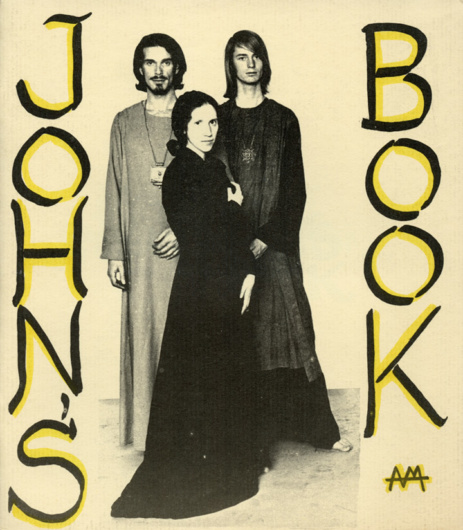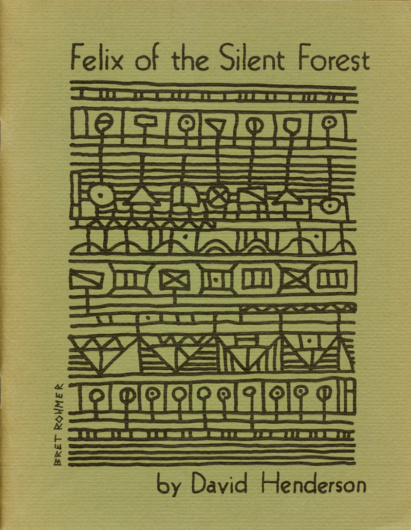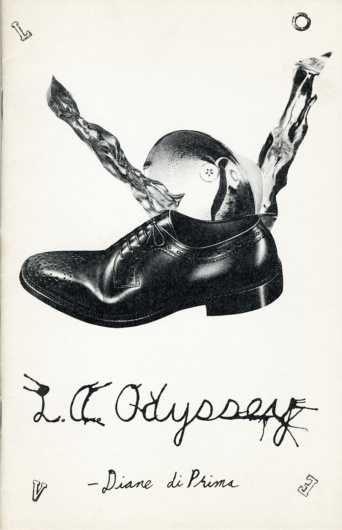Poets Press
Diane di Prima
New York
1963–1969
Alan Marlowe, John’s Book (1969). Introduction by Robert Creeley.

One of the most influential people in Diane di Prima’s life was her grandfather, Domenico Mallozi, a writer for the anarchist newspaper Il Martello (The Hammer) on New York City’s Lower East Side. His granddaughter followed in his footsteps, both as a writer and as an activist and internationalist, during the 1960s cofounding the New York Poets Theatre (which from 1961 to 1965 produced one-act plays by poets, with sets and decorations by a variety of artists), coediting The Floating Bear with LeRoi Jones [Imamu Amiri Baraka], and serving as a contributing editor to both Yugen and Kulchur.

David Henderson, Felix of the Silent Forest (1967). Introduction by LeRoi Jones.
From her apartment at 54 East Fourth Street in New York, and later from Kerhonkson in upstate New York, she ran the Poets Press. About its beginnings, she is characteristically to the point: “I bought a Davidson 241 and put it in a storefront…I went to ‘printing school’ for a week and learned how to run the machine (I was the only woman in the class), and I got on with it.” Poets Press published nearly thirty books, including many of di Prima’s own, as well as the first books of Audre Lorde, Jay Wright, and David Henderson, and works by Herbert Huncke and Michael McClure. Di Prima lived in Timothy Leary’s psychedelic community in Millbrook, New York, for six months in 1966–67 and published Leary’s Psychedelic Prayers in 1966. John Ashbery’s Three Madrigals was published in holograph reproduction in 1968. Di Prima moved in 1968 to the West Coast, where she continues her active involvement in poetry, publishing, and antiwar and ecological projects. She has taught in the Poetics Program at the New College of San Francisco and founded the San Francisco Institute of Magical and Healing Arts.

Diane di Prima, L.A. Odyssey (1969). Cover by George Herms.
Growing up in the fifties, you had to figure it out for yourself—which she did, and stayed open—as a woman, uninterested in any possibility of static investment or solution. Her search for a human center is among the most moving I have witnessed—and she took her friends with her, though often it would have been simpler indeed to have gone alone. God bless her toughness and the deep gentleness of her hand!”
— Robert Creeley, “Foreword for Diane” in Diane di Prima’s Pieces of a Song: Selected Poems (San Francisco: City Lights, 1990)
Poets Press books include
Ashbery, John. Three Madrigals. 1968.
Creeley, Robert. Mazatlan: Sea. 1969. Printed at the Cranium Press.
Creeley, Robert. 5 Numbers. 1968. Cover design, rubberstamp print by William Katz.
Di Prima, Diane. Earthsong: Poems 1957–1959. 1968. Cover drawings by George Herms.
Di Prima, Diane. Hotel Albert Poems. 1968.
Di Prima, Diane. L.A. Odyssey. 1969. Cover by George Herms.
Di Prima, Diane. The New Handbook of Heaven. N.d., (reprint of Auerhahn Press edition of 1963).
Di Prima, Diane. New Mexico Poem. 1968. (There is a question as to whether this is a Poets Press book.)
Di Prima, Diane, trans. Seven Love Poems from the Middle Latin. 1965.
Di Prima, Diane, ed. War Poems. 1968. Cover by John Braden.
Doyle, Kirby. Sapphobones. 1966.
Duncan, Robert. Play Time Pseudo Stein. 1969. Cover by the author.
Henderson, David. Felix of the Silent Forest. 1967. Introduction by LeRoi Jones. Cover by Bret Rohmer.
Huncke, Herbert. Huncke’s Journal. 1965. Drawings by Erin Matson.
Leary, Timothy. Psychedelic Prayers after the Tao Te Ching. 1966.
Lorde, Audre. The First Cities. 1968. Introduction by Diane di Prima.
Marlowe, Alan. A Handbook of Survival into the New Age. 1964. Broadside.
Marlowe, Alan. John’s Book. 1969. Introduction by Robert Creeley.
Marlowe, Alan. To a Growing Community (to Allen Ginsberg). 1968. Broadside.
Matson, Clive. Mainline to the Heart. 1966. Introduction by John Wieners. Drawings by Erin Matson.
McClure, Michael. Little Odes, Jan.–March 1961. 1968.
Spellman, A. B. The Beautiful Days. 1965. Introduction by Frank O’Hara. Cover by Ross Perez. Drawings by William White.
Wright, Jay. Death as History. 1967.
